|
|
|
Personnel
| Principal Investigator |
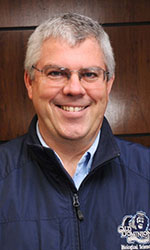 |
 Eric L. Walters, PhD - Grand Poobah Eric L. Walters, PhD - Grand Poobah
Eric grew up in Canada and obtained his BSc in marine biology at the University of Victoria. He initially worked with marine mammals (training seals, sealions, and killer whales [including Tilikum - the whale featured in the documentary Blackfish]; studying transient and resident killer whales; and conducting necropsies as part of a stranding program). After several years of consulting and work as a naturalist, he decided to return to the University of Victoria for graduate school. It was at this point that he switched from marine mammals to birds and eventually earned his MSc with Ted Miller, studying red-naped sapsuckers. Following a couple of summers working on the Mogollon Rim in Arizona as a crew leader for Tom Martin, Eric entered a PhD program at Florida State University with Frances James, where he examined the community of cavity users associated with endangered red-cockaded woopecker cavities. For his postdoctoral research, he held appointments with Doug Bolger at Dartmouth College and with Walt Koenig at UC Berkeley and Cornell University. He obtained a faculty position at Old Dominion University in the fall of 2011. He currently leads and coordinates the long-term study (50+ years) of cooperatively breeding acorn woodpeckers at the Hastings Reserve in Carmel Valley, California.
|
| |
|
| Postdoctoral Associates |
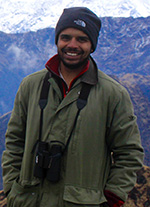 |
 Sahas Barve, PhD Sahas Barve, PhD
Sahas grew up in Mumbai, India and received a BS in Zoology from Mumbai University and an MS in Wildlife Sciences from the Wildlife Institute of India. After working on large mammals, king cobras, and sky-island endemic birds, he attended Cornell University for his PhD. His dissertation work involved climbing up and down mountains in the Himalayas to study the influence of physiology, interspecific competition, and habitats on the elevational distribution of birds. His postdoctoral work in the Walters Lab examines the movement ecology and life-history evolution of acorn woodpeckers.
Shizuka, D., S. Barve, A. Johnson, and E.L. Walters. 2022. Constructing social networks from automated
telemetry data: a worked example using within- and across-group associations in cooperatively breeding
birds. Methods in Ecology & Evolution 13:133–143
Barve, S., C. Riehl, E.L. Walters, J. Haydock, H.L. Dugdale, and W.D. Koenig. 2021. Lifetime reproductive benefits of cooperative polygamy vary for males and females in the acorn woodpecker (Melanerpes
formicivorus). Proceedings Royal Society B 288:20210579.
Barve, S., A. Lahey, R.M. Brunner, W.D. Koenig, and E.L. Walters. 2020. Tracking the warriors
and spectators of acorn woodpecker wars. Current Biology 30:982–983.
Barve, S., N.D.G. Hagemeyer, R.E. Winter, S. Chamberlain, W.D. Koenig, and E.L. Walters.
2020. Wandering woodpeckers: foray behavior in a social bird. Ecology 101(2):e02943.
Barve, S., W.D. Koenig, J. Haydock, and E.L. Walters. 2019. Habitat saturation results in joint-nesting
female coalitions in a social bird. American Naturalist 193(6):830–840. |
 |
 Spencer Schubert, PhD Spencer Schubert, PhD
Dominion Scholar
Spencer got his start in field ecology at St. Olaf College (Minnesota) studying tall-grass prairie small mammal communities. After graduating, volunteer experiences with the Blue-throated Macaw Conservation Center in Bolivia and through Cornell University studying woodpeckers in the Dominican Republic firmly set Spencer’s sights on future tropical work. As a technician at Hastings Natural History Reservation, Spencer contributed to a project investigating jays and their dispersal of California oaks.Some of his other positions include an internship with the University of Puerto Rico conducting seedling censuses in El Yunque National Forest and work with the Southern Sierra Research station monitoring western Yellow-billed Cuckoos in Arizona.
For his dissertation, Spencer returned to the Dominican Republic to investigate avian seed dispersal in tropical wet forests. Some of the research questions he addressed included: (1) how the timing and frequency of reproduction in zoochorous plants affects seed dispersal; (2) how the ecology of colony-nesting frugivorous birds can be applied to increase natural seed dispersal into target restoration sites; and (3) the applications of network models of plant-frugivore communities to forest succession and restoration in degraded tropical ecosystems.
He is currently working on the acorn woodpecker project studying helper trade-offs and how it affects group success.
You can read more about Spencer at his website.
Schubert, S. C. and E.L. Walters. 2022. Subannual phenology and the effect of staggered fruit ripening
on dispersal competition. Biotropica 54:31–4.
Schubert, S. C. 2018. Nesting of the Puerto Rican Emerald (Chlorostilbon maugeaus) and a record of nestling parasitism by botflies (Philornis sp.). Journal of Caribbean Ornithology 31:77-82.
Schubert, S. C., M. B. Pesendorfer, and W. D. Koenig. 2018. Context-dependent post-dispersal acorn predation in a California oak community. Acta Oecologia. 92:52–58.
|
| |
|
| Graduate Students |
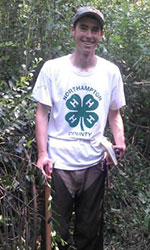 |
 Nick Flanders, PhD Candidate (started August 2014) Nick Flanders, PhD Candidate (started August 2014)
Nick grew up in Newport News, Virginia where his interest in birding began. He obtained a B.S. in Biology from Old Dominion University in 2011 and an M.S. degree from NC State in 2014. During his undergraduate career he was actively involved in applied ornithological research involving the response of bird communities to habitat management in the Great Dismal Swamp National Wildlife Refuge (NWR) and Rappahannock River Valley NWR in VA. His graduate thesis involved using occupancy models to estimate temporal and spatial variation in seabird distributions off the coast of New England in anticipation of offshore wind energy development.
His PhD work examines the role of frugivorous birds in the dispersal and distribution of oak mistletoe (Phoradendron leucarpum) in eastern VA and NC. Through this project, Nick aims to further develop his understanding of plant ecology, interactions between birds and plants in the southeastern US, and the use of occupancy models to estimate bird distributions.
Flanders, N.P., B. Gardner, K.J. Winiarski, P.W.C. Paton, T. Allison, and A.F. O'Connell. 2015. Key seabird areas in southern New England identified using a community occupancy model. Marine Ecology Progress Series 533: 277-290.
|
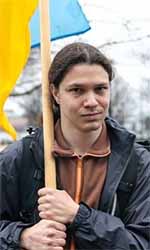 |
 Oleksii Dubovyk, PhD Candidate (started August 2020) Oleksii Dubovyk, PhD Candidate (started August 2020)
Oleksii is a Fulbright Scholar from Ukraine. His main research interests are in the spatial distribution of functionally rare landbird species in North America and their temporal changes relative to urbanized areas.
Zahorodnyi, I., O. Dubovyk, I. Komarnytskyi, and I. Dykyy. 2021. Diet of Long-eared Owl and Common Kestrel in an urban landscape (Ukraine). Ornis Hungarica 29:108–119.
D
Dubovyk, O., H. Kuzyo, and A. Bokotey. 2020. Density variation of “rare” breeding birds in native forests and urban parks. Geo&Bio 19:20–31.
Dubovyk, O., A. Bokotey, L. Pokrytiuk, V. Bodnar, Y. Strus, and O. Ruchko. 2020. Autumn migration of birds over Polonyna Borzhava (Ukrainian Carpathians). Zoodiversity 54:43–52.
Dubovyk, O. 2019. Annual dynamics of bird communities in urban parks in Lviv, Ukraine: preliminary analysis of diversity and composition variability. Studia Biologica 13:79–98.
|
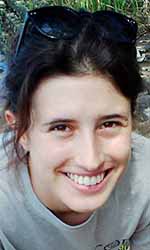 |
 Ella DiPetto, PhD Candidate (started August 2021) Ella DiPetto, PhD Candidate (started August 2021)
Ella is a National Science Foundation Graduate Research Fellow. Ella is studying the effect of oyster restoration structures on avian and mammalian diversity. |
 |
 Chi Wei, PhD Candidate (starting August 2022) Chi Wei, PhD Candidate (starting August 2022)
|
 |
 Angela Brierly, PhD Candidate (starting August 2022) Angela Brierly, PhD Candidate (starting August 2022)
|
 |
 Samantha Glover, MS Candidate (started August 2019) Samantha Glover, MS Candidate (started August 2019)
Sam's thesis is entitled "Novel mariculture of the Caribbean king crab for market and coral reef restoration". |
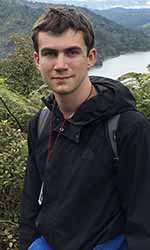 |
 Grant Bowers, MS Candidate (started August 2020) Grant Bowers, MS Candidate (started August 2020)
Grant's thesis is entitled "Nestedness and modularity of avian metacommunities across gradients of Chesapeake Bay island characteristics". |
| |
| Interns |
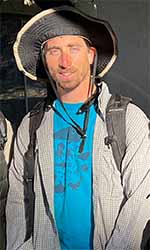 |
Doug Fitzpatrick, Acorn Woodpecker Project
|
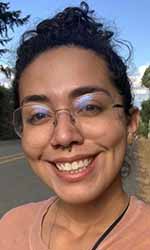 |
Mya Esquivel, Acorn Woodpecker Project
|
 |
Claire Chiswell, Acorn Woodpecker Project
|
| |
|
|
|
|



